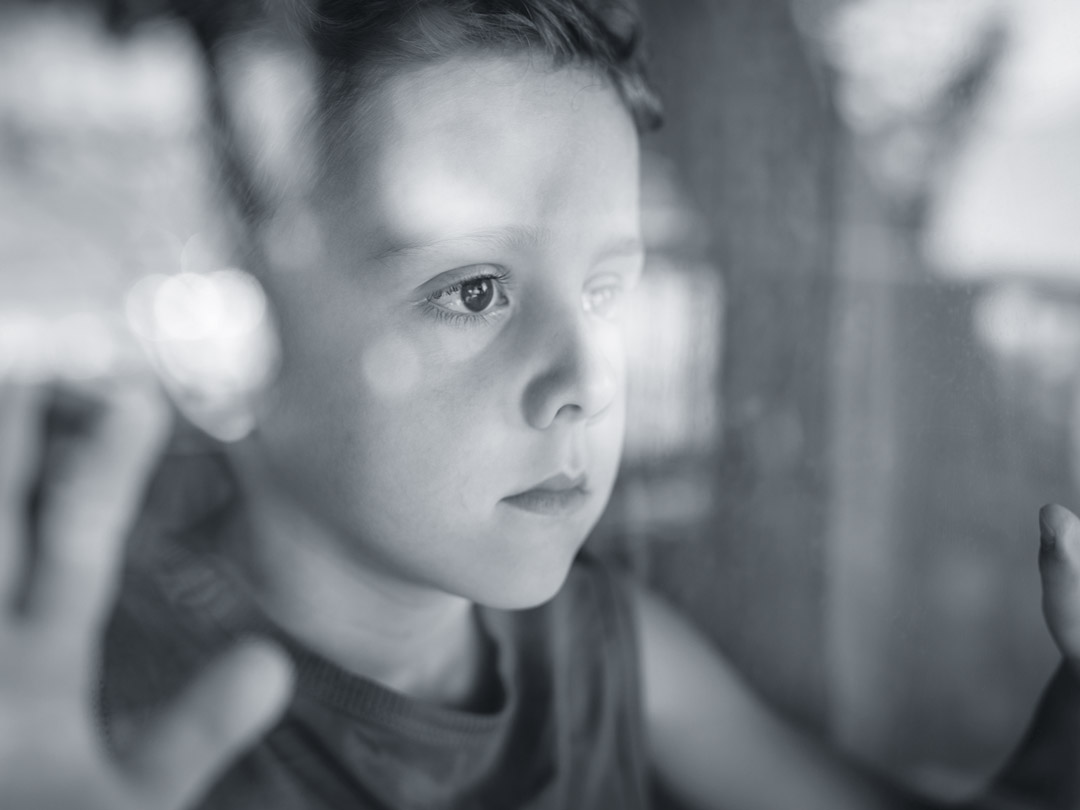Małgosia Kwiatkowska: Depression affects children and teenagers more and more often. This is proven by research and queues of young patients waiting for an available date for psychiatric consultations. Currently, more than 25,000 young people are being treated for depression in the public health service. This is twice as many as five years ago. It is suspected that up to 20 percent of teenagers may develop it before the age of 18. In addition, it is estimated that every third student experiences mental problems and that the largest increase in the incidence concerns depression and anxiety disorders. These statistics are terrifying.
Agata Fryś: Unfortunately, yes. It is worth noting, however, that only recently has depression among children begun to be the subject of research. It has become a branch of clinical psychology and psychiatry, which until now has dealt rather with depression among adults. Fortunately, more and more specialists are starting to be interested in the new field, important publications on the subject are being published, thanks to which our knowledge about the phenomenon itself is expanding.
MK: Can we talk about the age when young people are most exposed to depression?
AF: I would say that it is not age that matters here, but sensitive periods above all. Not necessarily a specific number of years is a factor that matters, but the changes that occur in a young person’s life. In addition to systemic changes – when toddlers start their adventure with learning or finish primary school and go to high school – I mean moments of biological change, when, for example, girls go through puberty and have trouble discovering their own identity. Again, significant, stressful family changes, such as divorce or the loss of a loved one, can also contribute to depression onset.
MK: Can depression symptoms be confused with behaviours associated with puberty or other mental disorders? Should we immediately suspect depression when we observe a lack of energy, no willingness to play, or worse grades in school?
AF: This is a very important question because, in my opinion, it points to an extremely important thing – never to be indifferent to the behaviour of our children. However, you have to proceed wisely. Thanks to – although in this context rather due to – the fact that we have more knowledge about psychology and human personality than 10 years ago, it is easier for us to put the wrong label on such moments. When we start to worry about our child’s behaviour, we are more likely to think of reasons we have already heard about – “he is going through puberty”, “he is an introvert” or “I read that tendencies towards anorexia are often associated with problems with acceptance by young girls their bodies.” There are many other reasons why behaviour can be worrisome, and it is hard to differentiate depression. A person changes throughout the whole life, and in this earliest developmental period changes occur very quickly, sometimes even “by express.” It is difficult to talk about the norm in children and teenagers, because these age groups evolve almost every day. However, psychiatrists and clinical psychologists point out that certain behaviours can be confused with other disorders. The situation is delicate. The most important thing is to be vigilant but not oversensitive.
MK: But can we say that depression is always associated, both in children and adults, with low mood and pessimism?
AF: It is often the case, but especially in children, aggressive, destructive, self-destructive behaviours, such as addictions, self-mutilation and rebellious behaviour may also intensify. In addition, it is possible that there will be problems with concentration, sleeping or remembering. Such a student brings worse grades, stops doing homework, and even doesn’t want to go to school. Children affected by depression close in on themselves, are accompanied by great fear and a negative attitude towards everything, they also judge themselves very harshly. They give up, feel trapped. There is a high risk of the emergence of the phenomenon of learned helplessness.
MK: A big problem appeared two and a half years ago. So much has changed in the lives of young people that identifying the causes of depression has become even more difficult.
AF: Yes. Lockdown, remote schooling, loneliness, lack of exercise, but also to some extent the war in Ukraine had an impact on this difficult situation. Students, accustomed to daily contact with each other, were locked in their homes. I don’t remember anything like this ever happening to children aged 12-13, who at that time learn to build close bonds, interact with others, understand and express their feelings, needs and disagreements towards another person. When a young person is sitting only in front of the screen, it is difficult to indicate the reasons for the change in their behaviour, since this is exactly their whole world at the moment. In my opinion, the most important thing is not for the parent to know how to label specific disturbing changes, but not to underestimate them and stay vigilant. Let’s consider the possibility of a mental disorder, but rather in order to seek help from a specialist. And a visit to a child psychologist or psychiatrist will allow us, which I deeply believe, to better understand our children and what is currently going on in their life. Regardless of what diagnosis we hear, we will certainly be richer with a large dose of knowledge.
MK: So let’s not try to diagnose ourselves right away, but above all, let’s be attentive?
AF: Yes, and in my opinion, assuming right away this is a depression or anxiety disorder case, or maybe some sort of addiction, does a young person a disservice, because it is often simply about the lack of a relationship between the parent and the child. And the improvement of that relationship can help in the fight against depression, among other things.
MK: Do I have a correct impression that we are touching on the current causes of depression at a young age?
AF: In my opinion, unfortunately yes. I added, unfortunately, because I consider the lack of ties to be today the most important reason for the occurrence of mental disorders among children and adolescents, that we are talking about. First of all, it is about the lack of ties within the immediate family – with a parent, caregiver. A child should feel from an early age they have someone to count on in difficult situations, and they are looking for this vertical relationship – the closest to themselves. Let us remember that the needs of a young person just getting to know the world go beyond the sense of material security, namely providing a roof over the head, food and clothes – they are based on a sense of emotional security.
MK: Parental love is fundamental for them. But peer bonding is also very important for young people, right?
AF: That’s right. Again, the pandemic period and the introduction of remote learning were a big problem in this respect. Also in these circumstances I would look to a large extent not only for the causes of depression, especially among teenagers, but also for suicide attempts, the number of which has recently increased alarmingly. It is very sad, but we are talking to a significant extent about children who really do not have friends at the moment – the computer becomes their only friend, and the closest group is a dozen or so people on a computer game chat. The handful of friends with whom they spend time at the school that is now open, definitely cannot be called trusted friends with whom they spend their free time and whose support they can always count on. Children feel and have a great need to have horizontal relationships, especially with people of a similar age, but they do not build deeper bonds because they have not really learned how to do that yet, and being locked down at home has made it much more difficult for them to develop these competences, if not utterly prevented it.
MK: Where else should we look for reasons?
AF: I would say outside. Among such factors, I would mention frequent quarrels or separation of parents, especially if one of them disappears or moves out. The experience of losing a loved one and the way the whole family experiences and copes with mourning are also dangerous. There are also school related issues. First of all, educational: for example, when the level of students in the class does not correspond to the real intellectual capabilities of our child. Disorders, including depression, occur relatively often in very talented and intelligent teenagers. Firstly, because their emotionality does not keep up with their highly developed intellect, and secondly, they do not feel understood in the peer group – they have a lot of opportunities to stand out, and at the same time, they feel left out. On the other hand, children who learn worse are sometimes harmed by the parent who tries at all costs to force the teachers to admit them to the next class despite the difficulties and poor grades. It is worth remembering that our child could not cope with their school duties for various reasons, not necessarily because they are not talented enough or have put too little work into their studies. These are the areas that are worth getting a closer look before making a decision that has such a big impact on a young person’s life.
MK: Environmental factors also play a role, right? Including experiencing abuse.
AF: Of course, we have always dealt with such situations, but rather in the presence of witnesses, in the school building or on the playground, thanks to which it was possible to deal with it immediately, solve the case somehow and confront the people involved in the incident. Today, unfortunately, many such situations take place online – without witnesses. Parents, having no access to this content, do not know what the child is going through, and the child, due to the lack of bond with the caregiver or because of a sense of shame or loneliness, does not share their experiences. However, not only violence brings danger, but also teenage love. For example, a girl falls in love for the first time in her life, experiences her first kiss, perhaps her first sex, she loves with her whole self… And when it comes to separating, she has the impression that her life has ended with the end of the relationship. It turns out that one event can leave a big mark on the soul and mind of a young person. It can make them lock themselves in a room, shut down – and such isolation can, as we have already mentioned, significantly contribute to the emergence of depression.
MK: Regardless of everything we’ve said, some people are more prone to depression than others.
AF: Yes, and this condition is influenced by biological (genetic) and personality factors, i.e., for example, in the prenatal period, the child is calm, and after birth, it is lonely, sensitive and introverted. Here I would also add depression suffered by a parent or caregiver. If someone in your family suffers from this mental disorder, there is a serious risk that your child will also develop it. I strongly encourage you to take care of yourself, which in turn will help you maintain balance at home. In addition, I would mention various chronic diseases or disabilities here. Very often, when a child suffers from, for example, diabetes, parents put a lot of energy and money into taking care of them. They buy the best equipment, get the best specialist in the province, and give a few-year-olds a telephone to inform them whenever the sugar level drops. And this child can’t cope with being different, can’t explain why, for example, they can’t eat chocolate with friends during the break. Siblings’ illnesses – disabilities, chronic or even fatal illnesses – are also important factors. Another example: a brother has leukaemia, which is not severe enough to kill him in six months, but sufficiently severe for his parents to take care of him alone for five years. And the mechanism is quite simple: a child set aside either metaphorically disappears, or, on the contrary, becomes visible through acting in a destructive way. Which, in my opinion, really means screaming for attention.
Finally, it is worth mentioning the impact of biochemical processes in the brain and also somatic causes. We just have to be careful, again. Hypothyroidism, Hashimoto’s disease, anaemia, mononucleosis, and iron deficiency all have some common symptoms that also occur with depression. As parents, we are unable to check them – a doctor, good tests and accurate diagnosis are needed here.
MK: We have already mentioned that sometimes depression leads to other serious consequences. In this case, I’m talking primarily about suicide attempts. Over the course of several years, their number in the age group from 7 to 18 has been steadily growing: from 730 in 2017 to over 1,496 in 2021. And the data for the first half of last year is already very alarming. According to police statistics, 1,244 people tried to take their lives by the end of July.
AF: It’s very sad, but this is the reality we face at the moment. Let me remind you once again that this state of affairs was largely influenced by the pandemic and the confinement of children at home. It is important to note that not every suicide attempt is about wanting to end life for real. From my perspective, this is often a dramatic cry for help. Let me emphasise it again: when a teenager’s bonds, both with family and friends, are getting weaker, then restless thoughts become more and more oppressive. And I believe that if all the difficult experiences we’ve just talked about – especially those related to emotionally poignant events in the life of a young person – are accompanied by the lack of relationships with parents and peers, then the foundation will be laid for very serious consequences in the form of mental disorders and self-destructive behaviour.
MK: So how to prevent such situations? First of all, we should work on the level of communication in our own home, right? It is about communication between adults, but also at the parent-child level.
AF: Yes, and that’s very, very important. Open, non-judgmental and non-critical communication significantly reduces the risk of childhood depression. Of equal importance, which is also worth noting, is that parents should treat their child as a normal, equal person – regardless of whether we are talking about a five- or fifteen-year-old one. Of course, we adapt the way of communication to the age of the child, but let’s remember to treat them and their needs seriously. Let’s check whether we ask not only how they feel at a given moment, but also why they feel that way. And let’s really try to understand everything we hear.
MK: And parents often relate to their own experiences in such situations.
AF: That’s right. In turn, our child’s emotions may be very different from ours, they may be different than before, and they may be different than those of their peers. On average, every person has suicidal thoughts at least once in their life, and we, adults, hearing a child say that they would like to disappear, do not allow ourselves to discuss this topic. We just cut it off as soon as possible, answering more or less: “That’s not allowed, you’ve been watching too many movies, too many games, never say that to me again.” Instead, ask the question, “Why do you feel this way?” Let’s try to listen and understand because it’s probably not suicidal thoughts underneath, but a completely different reason, for example: “I feel very embarrassed at school, everyone says I’m fat, and it’s so hard for me.” Let’s really open our ears, hearts and heads; let’s not use clichéd responses popping up in our heads; let’s accept that our child may feel differently. And by that I mean active permission, kindness and curiosity. Let’s accept the fact that it can be difficult for us to deal with the situation. Because it’s normal. It’s not about making it easy for us, but about understanding our child’s world. To this end, let’s look for solutions by taking small steps. Let’s not transfer our ambitions onto the child by enrolling them, for example, in violin classes, replacing playing computer games. Instead, perhaps, let’s sign up for nearby taekwondo classes together – it will be a mutual compromise and an attempt to establish a relationship, do something together. The most important thing is the good of the child and their needs, not our ideas of them.
MK: In addition, let’s make sure that the child has the opportunity to meet other people.
AF: It can also make us feel uncomfortable – our child prefers to confide their secrets to a colleague, younger aunt or friend of the house. Let’s not always ask a thousand questions like: “Why did you come back so late, where have you been for so long and with whom, how do you feel?” Let’s respect privacy, but at the same time signal that if necessary, we are ready to help, answer all doubts, provide support in difficult times.
And I would also like to point out that all the rules that we have now listed apply to both full families, with two parents, as well as those after separation. It is important that partners always speak with one voice. I am aware that this is not possible in all situations, but let’s try to talk and convey similar messages to the child – about their rights or boundaries. Let’s settle all doubts among adults, without involving the youngest member of the family. I encourage you to work out a common position, to try to create such a friendly environment for the proper development of a young person and for them to regain peace and a sense of security.
MK: But sometimes let’s also give ourselves permission to reach for outside help.
AF: Of course. Maybe it’s worth talking to your child’s favourite teacher, tutor, coach or pedagogue or school psychologist? Don’t be afraid to search for a specialist. If you are covered by the EAP program, consult ICAS Poland experts by phone or chat. And let’s remember, just going to a child psychologist does not mean that our several-year-old is suffering from depression. It is worth simply discussing the state of affairs and checking whether there is anything disturbing. Let’s broaden our knowledge about our own child, let’s get to know them, and if our anxiety due to changes in behaviour is growing, let’s check it out. Consultations do not have to mean psychotherapy or a disorder, they are supposed to provide a kind of hint. Don’t be afraid to ask the expert you’ve found questions. It may turn out that in the first weeks of therapy the child starts to submit complains and gets less polite from our point of view. But maybe they are just finally learning to express their emotions. Let’s ask what the treatment process is all about, which direction the work is heading in order to grasp the extent to which we are part of this psychotherapy. There are no clear roads here, there is no single path. Everyone follows their own. And it’s worth finding out what road awaits our family.
MK: To sum up, communication and attempts to build bonds at home, care and openness to other people, but also building communication outside constitute important – or even the most important – elements both in the treatment of depression and in its prevention. Is there anything else we can do to help our children stay mentally balanced?
AF: This is, of course, a very complex topic, but as with any other issue, the fundamentals are also important. I mean diet and exercise. A special list has even been developed, which includes foods richest in 12 nutrients which are of particular importance in preventing depressive disorders and supporting their treatment. And these are: folic acid, iron, omega-3 fatty acids, magnesium, potassium, selenium, thiamine, vitamins A, B6, B12, C and zinc. Where can we find them? Among others, in seafood, green leafy vegetables or peppers. Therefore, a Mediterranean diet rich in fats and vegetables good for the body will work. In addition, it is worth eliminating all processed foods and sugar.
It is also good to account for products rich in tryptophan needed for the production of serotonin, commonly known as the happiness hormone. It is a chemical substance that performs many important functions in the human body, primarily affecting the regulation of mood. Tryptophan can be found, among others, in pumpkin seeds, sunflower and sesame seeds, nuts, spinach and broccoli, dark chocolate and fish.
The production of this hormone is also probably increased by sport. Let me remind you that during physical activity, another hormone of happiness is released – endorphin, which improves our well-being and prevents the production of the stress hormone, cortisol. By practicing team sports, we provide ourselves with psychological support in the group, and by practicing any discipline we build self-esteem. As you can see, there are just advantages.
We should also remember that both a change in diet and exercising can contribute to building a parent-child relationship. Shopping together and cooking healthy, nutritious meals can become a kind of family fun time. Playing football together, running, rollerblading or cycling is also associated with pleasure and a nice time, and each of these activities will be good for everyone.
MK: Communication, diet, sports, relaxing outdoors or even at home while doing our favourite things. But the key to success, I feel, is the term “together.” To sum up, let’s learn to build a conscious life together not only for our children, but also for ourselves. This will help maintain the mental balance of each of us.
AF: Exactly. But you can’t force anything, or be artificial, for instance sitting on the couch and saying: “Now, my son, we must have a serious talk because we need to build a bond.” Let’s just offer each other one of the most valuable resources today – time. Let’s enjoy each other and treat each other with respect and kindness. You have to find space for it, you have to put effort into it. But I am convinced that this effort will pay off – in the form of a healthy, happier, calmer child who feels loved, but also in the form of a healthy functioning family. Nothing happens overnight. But it’s definitely worth working on.









